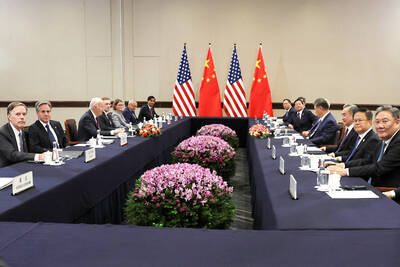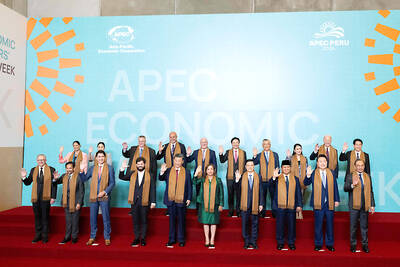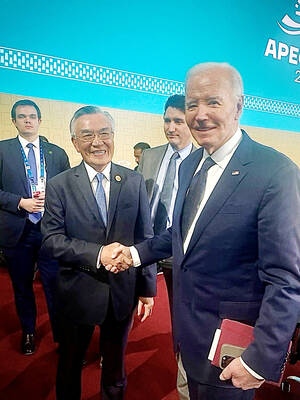President Chen Shui-bian (陳水扁) has asked the Executive Yuan to push for a NT$300 billion budget to buffer the impact of the SARS epidemic, Chinese-language media reported yesterday.
The plan is aimed at expanding public construction and public services over the next three years, the report said.
Premier Yu Shyi-kun plans to visit Legislative Yuan speaker Wang Jin-pyng (王金平) and opposition caucus leaders to canvass support for the plan, the reports said.
The Council for Economic Planning and Development (CEPD) started integrating local development projects into the plan during annual planning talks with local government heads in March, the report said.
An official from the CEPD said the plan will include infrastructure projects such as roads and bridges, and will also coordinate ongoing projects such as the high-speed rail link to give the flagging economy a boost.
The legislature has already passed an NT$50 billion SARS prevention and relief budget.
Earlier this month, the Directorate General of Budget, Accounting and Statistics (DGBAS) yesterday announced that first quarter economic growth has fallen to 3.21 percent from 4.22 percent for the fourth quarter of last year.
The Chung-Hua Institution for Economic Research predicted on April 17 that if SARS is not under control by year end, GDP growth for this year will be dragged down to 2.71 percent.
The government expects the slide in GDP growth to be slowed by various SARS-relief measures and the passage of the NT$50 billion public construction program.
But Yu said the package would not be enough.
"While the aid package may temporarily help industries hard hit by SARS, those measures won't be enough to support them if SARS drags on," Yu said earlier this month.
Economy gets blue light
Meanwhile, the nation's economy further deteriorated last month and was likely to continue struggling this month as a result of the Iraq war and the SARS outbreak, according to a government report published yesterday.
The report by the CEPD showed the index of leading indicators last month stood at 98.2 points, down 1 percent from March.
The index, which gauges economic activity for the following three to six months, showed a "blue" light last month. The light was "yellow-blue" in the first three months of the year.
In the council's five-color grading system, yellow-blue represents economic sluggishness and blue represents recession.
The last time the index showed blue light was in February last year.
Hu Chung-ying (
On May 16, the DGBAS cut the government's GDP growth forecast for this year to 2.89 percent from the 3.68 percent forecast made in February, reflecting the impact of the epidemic based on the assumption it can be contained by the end of next month.

ONE LAST TALK: While Xi said that Taiwan was a ‘red line,’ Biden, in what is likely his last meeting with Xi as president, called for an end to China’s military activity around Taiwan China’s military intimidation and economic coercion against Taiwan are the main causes of tensions that are destabilizing peace in the Taiwan Strait, Taipei said yesterday while thanking US President Joe Biden for expressing Washington’s firm stance of maintaining peace and stability in the region. Biden and Chinese President Xi Jinping (習近平) met on Saturday for their third meeting and their first talks in seven months on the sidelines of the APEC forum in Lima, Peru. It was likely Biden’s last meeting as president with Xi. During their conversation, Biden reiterated the US’ opposition to any unilateral change to the “status quo” from either

Taiwan would participate in the 2026 APEC summit to be hosted by China after Beijing promised it would ensure the personal safety of attendees, Taiwanese national security sources said yesterday. The APEC Leaders’ Machu Picchu Declaration announced yesterday said that China would host the APEC summit in 2026. Beijing proposed hosting the summit shortly before this year’s gathering began on Friday, a national security official said, speaking on condition of anonymity. Many APEC members expressed concerns about China hosting the event and said that prior communication over the decision was insufficient, the official said. Taiwan brought up concerns about legal “guidelines” China announced in

SUPPORT: Arms sales to NATO Plus countries such as Japan, South Korea and Israel only have to be approved by the US Congress if they exceed US$25m The US should amend a law to add Taiwan to the list of “NATO Plus” allies and streamline future arms sales, a US commission said on Tuesday in its annual report to the US Congress. The recommendation was made in the annual report by the US-China Economic and Security Review Commission (USCC), which contained chapters on US-China economic and trade ties, security relations, and Taiwan and Hong Kong. In the chapter on Taiwan, the commission urged the US Congress to “amend the Arms Export Control Act of 1976 to include Taiwan on the list of ‘NATO Plus’ recipients,” referring to

MEET AND GREET: The White House, which called the interaction ‘just a handshake,’ did not immediately respond to a request for comment on whether Biden planned to visit Taiwan’s envoy to the APEC summit, Lin Hsin-i (林信義), on Friday invited US President Joe Biden to visit Taiwan. During the APEC Leaders’ Informal Dialogue, Lin, who represented President William Lai (賴清德) at the summit, spoke with Biden and expressed gratitude to the outgoing US president for his contribution to improving bilateral ties between Taipei and Washington over the past four years, the Ministry of Foreign Affairs said. Lin and Biden exchanged views during the conversation, with Lin extending an invitation to Biden to visit Taiwan, it said. Biden is to step down in January next year, when US president-elect Donald Trump is